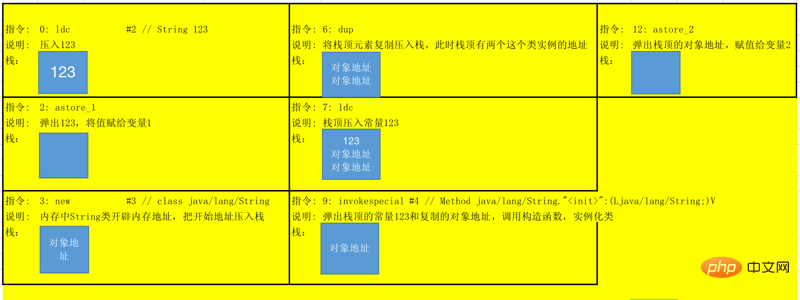Home >Java >javaTutorial >What is the difference between 'abc' and new String('abc') in Java?
What is the difference between 'abc' and new String('abc') in Java?
- 不言forward
- 2019-03-22 09:54:233149browse
The content of this article is about the difference between "abc" and new String ("abc") in Java? It has certain reference value. Friends in need can refer to it. I hope it will be helpful to you.
One of the favorite questions of Java engineer interviewers is what is the difference between "abc" and new String ("abc")? The better answers will bring out concepts such as Java heap, stack, constant pool, and references. But today it’s more than that. Let’s look at this issue from the perspective of instructions.
Text
We know that the compiled bytecode of the Java class is a binary file, not for humans but for machines to read. But Java has a javap instruction, which can translate bytecode into something that humans can understand.
javap is a Java class file decomposer that can decompile (that is, decompile files compiled by javac), and you can also view the bytecode generated by the java compiler. Used to decompose class files.
Now there is a class, defined as follows
public class A01 {
public static void main(String ... args){
String a = "123";
String c = new String("123");
}
}
First use javac A01.java to compile it into bytecode, and then use javap -c A01.class to decompile. Get the following text
Compiled from "A01.java"
public class javap.A01 {
public javap.A01();
Code:
0: aload_0
1: invokespecial #1 // Method java/lang/Object."<init>":()V
4: return
public static void main(java.lang.String...);
Code:
0: ldc #2 // String 123
2: astore_1
3: new #3 // class java/lang/String
6: dup
7: ldc #2 // String 123
9: invokespecial #4 // Method java/lang/String."<init>":(Ljava/lang/String;)V
12: astore_2
13: return
}</init></init>
We mainly look at the following text about the main method. There are not many instructions involved. I sorted it out
ldc: Load the constant light into the operand stack
astore_1: Save the value of the top element of the stack to variable 1
new: Open up memory space for the class instance to be created, and push the address into the operand stack
dup: Copy the top value of the operand stack, And push it onto the top of the stack
invokespecial: call a method, the method in the example is the constructor of the class
Now we combine the instruction and operand stack to simulate a calculation

Back to the original question, the difference between a="123" and a=new String("123"), the former points to the address of the constant pool, the latter points to the new address in the heap opened address. The results of these two == are naturally unequal. What about the result of equals? equals compares the contents character by character and is equal.
This article has ended here. For more other exciting content, you can pay attention to the Java Tutorial Video column of the PHP Chinese website!
The above is the detailed content of What is the difference between 'abc' and new String('abc') in Java?. For more information, please follow other related articles on the PHP Chinese website!
Related articles
See more- How to determine whether a file is hidden in Java? (code example)
- What is the difference between HashMap and Hashtable in java
- Analysis of Java public and private keys (with code)
- Introduction to the method of batch modifying file suffixes in Java
- Introduction to JavaScript declaration hoisting (with examples)

